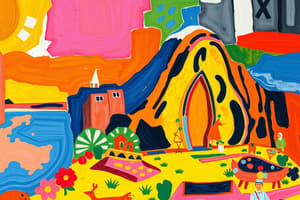Podcast
Questions and Answers
Which component of general culture primarily serves as a primary means of communication?
Which component of general culture primarily serves as a primary means of communication?
- Language (correct)
- Social Institutions
- Art and Literature
- Norms and Values
What term describes the accepted behaviors within a society?
What term describes the accepted behaviors within a society?
- Traditions
- Rituals
- Norms (correct)
- Values
Which of the following influences moral values and social structures within a culture?
Which of the following influences moral values and social structures within a culture?
- Economic Systems
- Language
- Art and Literature
- Religion and Beliefs (correct)
Cultural diversity is vital for which of the following reasons?
Cultural diversity is vital for which of the following reasons?
What is the process by which elements of one culture are adopted by another called?
What is the process by which elements of one culture are adopted by another called?
Which of the following is not a challenge to general culture?
Which of the following is not a challenge to general culture?
What influences individual behavior and societal expectations within a culture?
What influences individual behavior and societal expectations within a culture?
What is a significant consequence of globalization on culture?
What is a significant consequence of globalization on culture?
Flashcards are hidden until you start studying
Study Notes
Definition of General Culture
- Encompasses the shared beliefs, values, practices, and customs of a group or society.
- Influenced by factors such as history, geography, religion, and social structures.
Components of General Culture
-
Language
- Primary means of communication.
- Reflects cultural identity and values.
-
Norms and Values
- Norms: Accepted behaviors within a society.
- Values: Core principles that guide behavior (e.g., honesty, respect).
-
Traditions and Customs
- Rituals and ceremonies passed down through generations.
- Include festivals, holidays, and life events.
-
Art and Literature
- Expressions of culture through visual arts, music, and writing.
- Important for cultural identity and continuity.
-
Religion and Beliefs
- Major influence on moral values and social structures.
- Shapes rituals and community practices.
-
Social Institutions
- Family, education, government, and economy.
- Structure and organization of society.
Importance of General Culture
- Fosters social cohesion and identity.
- Influences individual behavior and societal expectations.
- Facilitates communication and understanding among diverse groups.
- Affects political, economic, and social systems.
Cultural Diversity
- Refers to the variety of cultural expressions within a society.
- Promotes tolerance and appreciation for different perspectives.
- Vital for innovation and creativity in society.
Cultural Change
- Culture evolves over time due to globalization, technological advancements, and social movements.
- Can lead to cultural diffusion, where elements of one culture are adopted by another.
Challenges to General Culture
- Cultural homogenization: Loss of unique cultural identities due to globalization.
- Cultural appropriation: Misuse of elements of one culture by another, often without understanding or respect.
- Conflicts arising from cultural differences, including discrimination and intolerance.
Definition of General Culture
- Represents the collective beliefs, values, practices, and customs within a group or society.
- Influenced significantly by history, geography, religion, and social structures.
Components of General Culture
- Language
- Serves as the primary communication avenue.
- Acts as a mirror reflecting cultural identity and values.
- Norms and Values
- Norms define expected behaviors in a society, guiding daily interactions.
- Values encapsulate core principles that influence behaviors, such as honesty and respect.
- Traditions and Customs
- Include rituals and ceremonies that are transmitted across generations.
- Comprise festivals, holidays, and significant life events.
- Art and Literature
- Serve as reflective expressions of culture through various mediums, including visual arts and music.
- Essential for maintaining cultural identity and continuity.
- Religion and Beliefs
- Play a crucial role in shaping moral values and social structures.
- Influence community practices and ceremonies.
- Social Institutions
- Include entities like family, education, government, and economy that organize societal functions.
Importance of General Culture
- Promotes social cohesion and builds a sense of identity among individuals.
- Guides individual behavior and forms societal expectations.
- Enhances communication and understanding among diverse cultural groups.
- Plat a significant role in shaping political, economic, and social systems.
Cultural Diversity
- Refers to the multitude of cultural expressions existing within a society.
- Encourages tolerance and a greater appreciation for different viewpoints.
- Essential for fostering innovation and creativity within communities.
Cultural Change
- Cultures evolve over time, influenced by globalization, technology, and social movements.
- Can lead to cultural diffusion, where aspects of one culture are embraced by another.
Challenges to General Culture
- Cultural Homogenization
- The erosion of unique cultural identities due to the effects of globalization.
- Cultural Appropriation
- Occurs when elements from one culture are used by another without proper understanding or respect.
- Cultural Conflicts
- May result from misunderstandings or intolerance arising from cultural differences, often leading to discrimination.
Studying That Suits You
Use AI to generate personalized quizzes and flashcards to suit your learning preferences.



